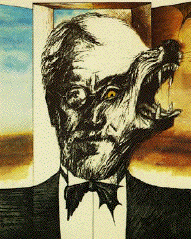Thomas Jefferson
I've been reading and teaching Thomas Jefferson lately, and something strikes me that never has before. Jefferson's vision of America is a constantly violent one. I had always emphasized the "revolutionary" themes in Jefferson as being "revolutions of ideals." But he really does mean to express these changes via violence, should the means of representative government fail: "What country can preserve its liberties, if its rulers are not warned from time to time, that this people preserve the spirit of resistance? Let them take arms" (Letter to Colonel Smith, 1787).
I was also surprised of Jefferson's characterization of the gun's honorific role: "Since the invention of gunpowder has armed the weak as well as the strong with missile death, bodily strength, like beauty, good humor, politeness and other accomplishments, has become but an auxilary ground of distinction." (Letter to John Adams on Natural Aristocracy).
I'd always thought of Jefferson and the other founders as being judicious about the use of violence in issues of state, since they tried many times to pursue justice for the colonies before cessation. However, now I'm getting a clearer picture that Jefferson intended for perpetual governance: the threat of "missile death" for the unjust and unlawful, should they cross the will of the people.
It would take a constant optimism about human nature to support this regulatory mechanism. Thank God Jefferson had no short supply of that. But does America have this optimism today? If not, is this conception of agrarian check and balance hopeless? I suppose this is the heart of the debate surrounding the second amendment, but I'm more interested in discovering whether or not ANY Americans (militia members aside) conceive of their relation with the government in a way that bears any resemblance to this.
My strong feeling (unconfirmed) is no. Which leads me to wonder why. The solution that comes quickly to mind is that Americans either a) have trust in the government to do right by them or b) have, with the rest of the world, become intimidated by the standing military might that would more than likely be set against them or c) are non-violent.
I think the answer is a combination of a and b. But it strikes me as odd that even an optimist like Jefferson believes that the power of government corrupts to the point of necessitating rebellion. It seems like we still believe that power corrupts, but we no longer believe in the rebellion.

